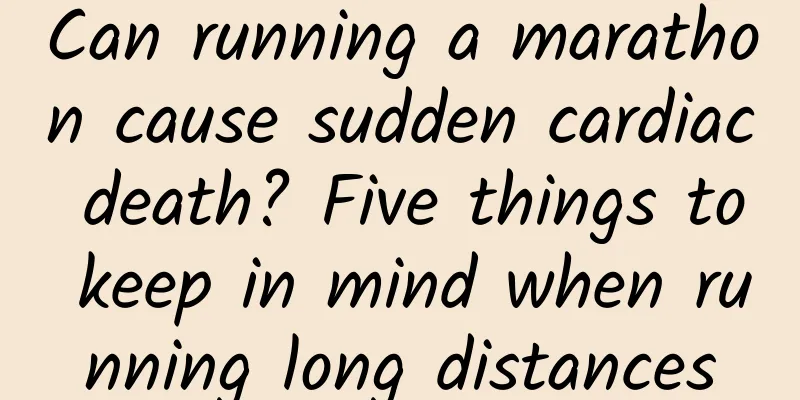Can running a marathon cause sudden cardiac death? Five things to keep in mind when running long distances

|
The 2023 marathon events are coming, and the ones in Jilin, Chongli, Tianjin and other places have been successfully concluded. The Beijing Marathon is about to start, and runners will meet between the red walls and green tiles, and measure the ancient capital with their footsteps. But in this event of struggle and passion, a health problem cannot be ignored, that is, sports-induced sudden death! In recent years, sudden deaths have occurred frequently in marathon events at home and abroad: At the 2023 Guilin Marathon in Guangxi, a 69-year-old man collapsed and never woke up again. At the 2023 Gold Coast Marathon in Queensland, Australia, a 34-year-old man died suddenly 100 meters before the finish line. At the 2019 Hubei Jingzhou International Marathon, half marathon runner Zhang fell to the ground 100 meters away from the finish line and unfortunately passed away. Exercise is meant to keep fit, so why has it become a killer? 1. Exercise is a trigger for sudden death, not the cause Sudden death during exercise refers to non-traumatic accidental death that occurs during exercise or within 24 hours after exercise. Although it is called "sudden death during exercise", its main cause is not exercise, but the occurrence of other diseases induced by exercise. Among sudden deaths during exercise, sudden cardiac death (SCD) has the highest incidence. It is generally believed that cardiomyopathy, including hypertrophic cardiomyopathy and arrhythmogenic right ventricular cardiomyopathy, is the most common cause of sudden cardiac death. Non-cardiac sudden death is sudden death caused by other unknown causes such as drug poisoning, food poisoning, chemical poisoning, allergic mental stress, water and electrolyte metabolism disorders, severe infection, multiple organ failure, etc. 2. What are the signs before sudden death? Marathon running is an extreme sport. Sudden death during exercise is like an invisible killer lurking around people, making it hard to guard against. However, it is not without signs. Runners should pay attention if they experience the following: 1. Chest tightness and chest pain Severe, crushing pain in the chest and a feeling of difficulty breathing. 2. Palpitations and panic It is a common symptom of arrhythmia and often occurs when one is excited or overworked. 3. Increased or decreased blood pressure Patients with aortic dissection experience severe pain and severe increase in blood pressure, which are precursors to sudden death; low blood pressure can easily lead to prolonged cardiac arrest, leading to sudden death. 4. Exhaustion Feeling exhausted for unknown reasons, accompanied by other symptoms such as chest tightness or lower limb edema. 5. Numbness of limbs and blackness before eyes Stroke is also an important cause of sudden death, especially for patients with hypertension, coronary heart disease or atrial fibrillation. If they experience stroke symptoms such as blacking out of the eyes and numbness of the limbs, they should seek medical attention immediately. 3. Get first aid measures Sudden cardiac death occurs suddenly, so it is very important to learn how to deal with it. 1. Quickly determine the condition. Within 10 seconds, pat and call the person who has fallen to the ground, observe whether there is any spontaneous movement of the body to assess the state of consciousness, observe the rise and fall of the chest and whether there is spontaneous breathing to assess the respiratory status, and touch the aorta (carotid artery) to see if there is a pulsation to assess the circulation status. 2. Immediately call 120 for emergency medical assistance (EMS). 3. Perform effective cardiopulmonary resuscitation (CPR) on site in a timely manner to maintain the patient's basic blood perfusion. Pay attention to the following points during the operation: Location: The lower half of the patient's sternum, i.e. the midpoint of the line connecting the two nipples; Position: Place the base of your left palm against the patient's chest, overlap your hands, raise the five fingers of your left hand, and stretch your arms straight; Compression: Use upper body strength to press 30 times continuously, with a frequency of 100 to 120 times per minute, and a depth of 5 to 6 cm below the sternum; Ratio: The ratio of chest compressions to artificial respiration is 30:2, that is, 2 artificial respirations are performed after every 30 chest compressions. 4. If there is an automated external defibrillator (AED) at the scene, it should be used as soon as possible to provide treatment. 4. Remember these five points to avoid sudden death during exercise Faced with the marathon fever sweeping the world, while runners are enthusiastically participating, what preparations should they make in advance before starting the race to avoid sudden death during exercise? 1. Physical examination and health assessment Before participating in a marathon, it is very necessary for runners to undergo a comprehensive physical examination and health assessment. This can help identify potential heart problems or other health risks and take appropriate measures. 2. Appropriate training and reasonable planning A proper training plan is essential to reduce the risk of sudden death. Runners should gradually increase the intensity and mileage of their training to avoid overexertion. In addition, they should arrange their rest time properly to give their body a chance to fully recover. 3. Pay attention to the environment and climate Running in high temperature and high humidity increases the risk of sudden death. Runners should choose appropriate times and places to train and avoid strenuous exercise in extreme weather conditions. In addition, they should maintain adequate water intake to avoid dehydration. 4. Pay attention to body signals and self-monitor Runners should learn to listen to their body's signals and take timely action. If abnormal symptoms such as chest tightness, difficulty breathing, dizziness, etc. occur, they should stop exercising immediately and seek medical help. 5. Maintain good living habits Runners should exercise regularly, eat a healthy diet, get enough sleep, manage stress, quit smoking and limit alcohol consumption. |
<<: We are running out of time, only 90 seconds left! What does the "Doomsday Clock" mean?
Recommend
Medicinal value of phoenix grass
The culture of traditional Chinese medicine is ve...
The "distinguished guest" from the Arctic Ocean appeared in Yong'an. How rare is this migratory bird?
Grey-footed sandpiper. Photo by Guo Geng Recently...
What surprises will there be when samples from asteroid Bennu return?
At 10:53 a.m. EST on September 24, the Pluto prob...
It’s terrifying to think about it. Why are there so many coincidences in nature and mathematics?
The sun rises and sets, the grass grows and the b...
Invisible "foreign body": What should you do if breast nodules are detected during a physical examination?
"Nodules", "polyps", "cy...
Will I end up owing a lot of money if I never cancel my mobile phone card or bank card?
Planning and production Source: Curious Doctor Ed...
The efficacy and function of underground pearls
As a traditional Chinese medicine, underground pe...
Can ginseng be refrigerated?
After we buy ginseng, if we cannot eat it all in ...
What are the effects and functions of milk flower
If we often go to the wild, we can see a kind of ...
The efficacy and function of celery
Traditional Chinese medicine requires the use of ...
The efficacy and function of white sesame
Many people know that sesame is very helpful for ...
The efficacy and function of hibiscus
Hibiscus tiliaceus has a long history, and up to ...
Overview of Danshen Tablets
Danshen tablets are currently a commonly used med...
WTCF: World Tourism Cities Development Report 2022
The COVID-19 pandemic has had a profound impact o...
Why Fuzhou?
Fuzhou The capital city of Fujian The place lives...









